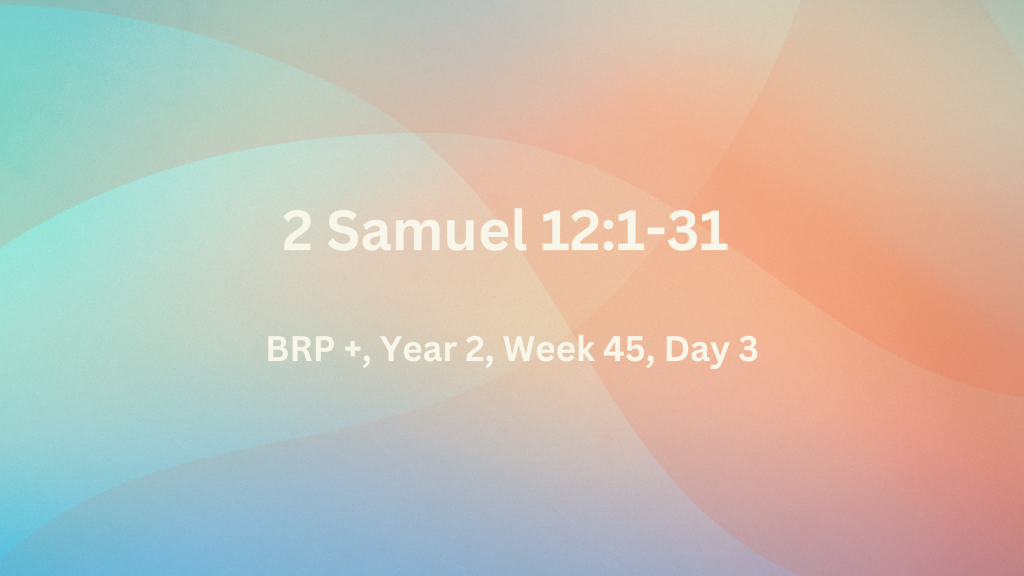2 Samuel 12:1-31
Q.1. What message did God give David through Nathan? What was David’s response? To whom was the story directed? – (2 Sam.12:1-7)
The Lord sent Nathan the prophet to David with a parable. In it, God told of a ‘rich’ king taking what belonged to his ‘poor’ servant. David responded angrily – As the Lord lives, surely this man deserves to die. He must make restitution for the lamb fourfold because he did this thing and had no compassion (2 Sam.12:5-6). Nathan then applied this message and accused David saying – You are the man! … (2 Sam.12:7).
Q.2. How much had God blessed David? Why were David’s actions such an affront to God? How did the king respond? – (2 Sam.12:7-15)
God reminded David of the favour He had extended to him. God had protected him from Saul and given him his wives – and I gave you the house of Israel and Judah (2 Sam.12:8). He told David that by murdering Uriah and taking his wife, he had despised the word of the Lord. As punishment, God said He would give David’s wives to another, who would lie with them in broad daylight. – Indeed you did it secretly, but I will do this thing before all Israel, and under the sun (2 Sam.12:12). David’s response revealed his heart, when he said to Nathan – I have sinned against the Lord (2 Sam.12:13). Nathan told David – The Lord has also taken away your sin; you shall not die. However, because by this deed you have given occasion to the enemies of the Lord to blaspheme, the child also that is born to you shall surely die (2 Sam.12:13-14). David previously had set such an example of godliness and had enjoyed God’s approval in all he did. For that reason, this sin reflected badly on the name of the Lord.
Q.3. How did David respond to his sick child? Did his servants understand him when the boy died? How did David view his passing? – (2 Sam.12:16-23)
True to God’s word, Bathsheba’s son became very ill. With continual prayer and fasting, David sought the Lord to heal his son, thus displaying his total dependence on God. He lay prostrate before the Lord all night, keeping a vigil (2 Sam.12:16). His servants tried to get him to eat but he refused and stayed praying before the Lord (2 Sam.12:17). When the child died, David’s servants kept the news from him, fearing that he might do harm to himself (2 Sam.12:18). David noticed and asked if the child had died. When he knew this was true – David arose from the ground, washed, anointed himself, and changed his clothes; and he came into the house of the Lord and worshiped (2 Sam.12:20). His servants were confused, so David explained – While the child was still alive, I fasted and wept; for I said, Who knows, the Lord may be gracious to me, that the child may live. But now he has died; why should I fast? Can I bring him back again? I will go to him, but he will not return to me (2 Sam.12:22-23). This was the perfect reasoning of a truly godly man.
Q.4. How did David interact with Bathsheba and Nathan? Why was God’s name for their son a surprise? What do we learn about Joab? How did the war with Ammon go? Who wore the crown? – (2 Sam.12:24-31)
David had made his peace with God. However, he did not ignore the grief of Bathsheba, but comforted her (2 Sam.12:24). For David, the loss was much more about God and Bathsheba, than about himself (c.f. 2 Sam.12:21-23). Bathsheba conceived again. David called this son Solomon, meaning Peace (2 Sam.12:24). It may seem at times that we cannot recover from certain sins (c.f. 1 Cor.6:9-11). The story of David proves otherwise, for it is written – Now the Lord loved him and sent word through Nathan the prophet, and he named him Jedidiah for the Lord’s sake (2 Sam12:24-25). This is pure grace. David had a capable general of his army in Joab. However, David had compromised himself in the matter of Uriah, and this seemed to go to Joab’s head (2 Sam.12:26-28 c.f. 2 Sam.11:14-24). He did offer David the honour of winning the battle against the Ammonites. Then David conquered the cities – and he brought out the spoil of the city in great amounts (2 Sam.12:30). He also gained a magnificent crown – … its weight was a talent of gold, and in it were precious stones; and it was placed on David’s head (2 Sam.12:30). This crown was both magnificent and huge.

